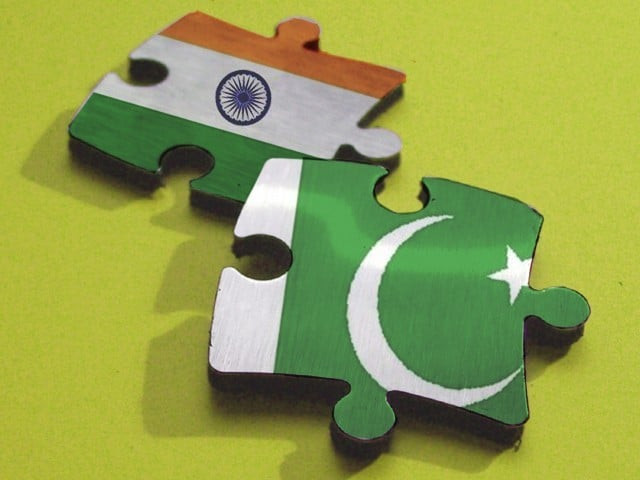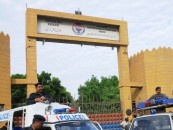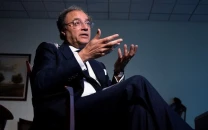Analysis: Seizing the historic opportunity
Both Modi and Sharif have an historic opportunity to retune bilateral relations.

PHOTO: FILE
History is certainly on the side of the prime ministers of the two countries that have remained locked in an acrimonious helter-skelter relationship, often marred or dogged by two fundamental issues: Kashmir and terrorism. Modi is unbound in the parliament by virtue of his absolute majority in the Lok Sabha, facilitated by the huge Indian industrial complex and business conglomerates. He rode to power on the promise of economic revival, employment generation and his party apparently vies for a peaceful neighbourhood, and hence the invitation to Nawaz.
Sharif, too, enjoys an historic political backing – ANP, PPP, MQM, and even PTI – all back him in his endevour for good relations with India. One would assume that the GHQ, too, sees promise and purpose in normalisation with India. And, of course, like Modi, the Sharifs, too, are wedded to the idea of economy being central to the survival of a country.
Both Modi and Sharif have an historic opportunity to retune bilateral relations; however controversial for his communal past and long history of relations with RSS, Modi can try to convince Sharif and others that he now transcends Modi – the chief minister of Gujarat. This way he might be able to rub off some of the negative images and perceptions woven around his persona. This also underlines the fact that the ‘plight of the Indian Muslim-factor’ did not play out much for several domestic reasons.
For Sharif, the meeting represents a rare chance to break the ice, accept Modi as the representative of the will of 1.27 billion people, where 31% of the registered voters favoured the BJP over other mainstream and regional parties.
Both Sharif and Modi face enormous challenges; India bulging with more than 50% of its population that is below the age of 25, and at least 380 million living below the poverty line, with millions jobless. Pakistan’s youth bulge – over 60% of population being below the age of 25 - with millions unemployed and over 55 million below the poverty line. Coupled with the incompetence of the public sector, frightful scandals and a spate of endless litigations, both prime ministers face similar daunting challenges. Both can certainly share visions and draw lessons from their respective experiences. But there is a huge caveat to this: summit meetings – both formal and informal – usually generate substantial optimism. Whether they translate into substantial mutually satisfying tangibles is an altogether different story.
Herein lies the real test for Sharif. The BJP has already articulated its intention of talking tough on what it calls the ‘terrorist infrastructure in Pakistan’. The obvious references are the India-focused militant groups still averse to the idea of talking with India.
And herewith begins Sharif’s challenges; his first challenge requires him to be as confident as the nationalist Modi sounds. A Sharif-led Pakistan does not have to poke fun at the communal or caste side of India (which Modi belongs to), nor must they invoke historical instances such as the two-nation theory to justify Cold War era policies. Dialogue among nations today is anchored in the quest for political autonomy as well as commercial linkages that guarantees economic and commercial growth at home.
Secondly, the Pakistani leadership does not have to judge Modi on his record at his treatment of Muslims in India. Concern for human rights anywhere in the world is legitimate but Pakistanis need to care more for the majority and minority rights at home rather than bemoan ‘mistreatment’ of their ideological soul-mates elsewhere.
Let the Indians take care of their fellow citizens – whether Muslims, Christians or from other communities.
Thirdly, given Pakistan’s adverse socio-economic conditions, it needs to embed its dialogue with India in modern realpolitik rather than in an ideology that is being torn apart by the commercial greed of industry, including the electronic media, and exploited by political forces of status quo in both countries.
Fourthly, the Pakistani leadership must realise that the test of its intent for friendly relations the new Indian government will rest on the January 2004 Islamabad declaration, which had committed Pakistan not to allow its territory to be used for terrorism against India.
Rather than indulging in cosmetic corrective measures for dealing with issues of terrorism and militancy, Pakistan must embrace the rule of law – enforcement of law – as the fundamental imperative for addressing reservations not only of India but also of Afghanistan, China and the United States.
Current circumstances demand a holistic approach ie coordinated foreign and internal security policies that can take care of exogenous concerns. The civilians and the entire security apparatus must sit together and agree on the Cold War-era ‘tit for tat’ mindset that continues to hold Pakistan. It cannot afford to be seen as the embodiment of the ‘cloak and dagger’ dictum any more.
Parity with India is out of question. But this doesn’t preclude meaningful, sincere and pragmatic talks with Delhi. Only countries such as the United States and Russia or China possess the wherewithal that gives them the liberty to act in a ‘might is right’ manner.
Lastly, despite its legitimate position on Kashmir, Pakistan shall have to invoke extremely deft and innovative responses to Modi’s contempt for Article 370 of the Indian constitution, an article that accords special status to the disputed Himalayan state.
India and Pakistan are perhaps on the threshold of a new beginning. The onus – given the adverse international environment – is more on Pakistan than India.
Published in The Express Tribune, May 25th, 2014.



















COMMENTS
Comments are moderated and generally will be posted if they are on-topic and not abusive.
For more information, please see our Comments FAQ